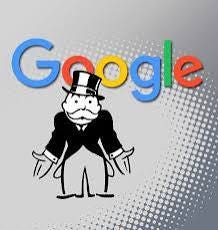Federal Judge Amit Mehta after ruling that “Google is a monopolist, and it has acted as one to maintain its monopoly” in the $400 billion interstate search advertising markets in violation of Sherman Anti-Trust Act, is now set to issue massive penalties and fines that could result in over $100 billion paid by Google competitors and users.
Google’s ubiquitous worldwide market share of search is 91.91 percent; followed by Microsoft at 3.64 percent, Yandex at 1.61 percent, Baidu at 1.15 percent, Yahoo at 1.13 percent, DuckDuckGo at .55 percent.
United States of America vs Google LLC decision as the largest anti-trust judgement since the 1982 break-up of American Telephone, fundamentally represents and the end of the Democrats’ honeymoon with Silicon Valley and Big Tech is now on Trial.
Google was founded in 1998, just before the dot-com bubble crash in 2000 devastated Silicon Valley. Despite the economically depressed environment, firms such as Facebook,Twitter, Instagram, LinkedIn, Pinterest, Twitter, and YouTubewere formed to monetize user-generated content by providing“platforms” for users to communicate.
Silicon Valley’s business ethics encouraged “doing something first, and asking regulators forgiveness later.” Fueled by enormous capital influx, big Silicon Valley start-up companies like Google celebrated moving fast to disrupt existing industries and arrangements by whatever means was necessary.
By 2007, Google was under investigation by the Republican Bush Administration’s Justice Department over issues including broadband access, net neutrality, privacy rights, patent reform, and copyright policy. The threat of being prosecuted as a monopoly caused Google in 2008 to terminate its negotiations to form an Internet advertising partnership with its number two competitor, Yahoo.
The New York Times named President Obama the “first truly digital President,” because of his victorious 2008 campaign’s “reliance on social media to lift him out of obscurity.” The driving force behind that disruptive effort was Facebook co-founder Chris Hughes, who left the Palo Alto start-up in 2007 to use social media to lift the junior U.S. Senator from Illinois out of obscurity and into the White House.
Hughes “stoked deep and meaningful CEO connections” with Google’s Eric Schmidt, Apple’s Steve Jobs, Microsoft’s Bill Gates, Facebook’s Mark Zuckerberg and scores of Silicon Valley entrepreneurs and venture capitalists. Hughes was later rewarded by being named to three powerful executive positions in the Obama Administration; including chief technology officer, chief data scientist, and chief performance officer.
Google donated $817,855 to Democrat Obama’s 2008 campaign. CEO Schmidt personally donated $1 million of the $12.9 million annual budget to form the supposedly non-partisanNew America Foundation economic advisory committee. Schmidt as NAF Chairman, traveled with Obama on the 2008 campaign trail as economic policy expert.
While Google’s Schmidt coached Obama’s campaign team,“executives from Craigslist, Napster, and Linkedin helped withfundraising.” Obama won all nine tech-heavy Bay Areacounties, scoring 84 percent of the vote in San Francisco.
President-elect Barack Obama at his first post-election press conference featured a silent Google CEO standing elbow-to-elbow with Obama’s top economic thinkers, in what was seen as power-play by Google competitors. Google’s advertising revenue over the next 16 years jumped to $47 billion in 2014, $146 billion in 2021, and will pass $300 billion in 2024.
The U.S. Justice Department anti-trust action appeared dormant,until the Republican Trump Administration launched the anti-trust action in 2018, to allege Google was paying tens of billions of dollars a year in kick-backs to companies including Apple, LG, Motorola, Samsung, AT&T, T-Mobile, Mozilla, Opera, and Verizon to make sure Google is the only search engine consumers saw.
The Department of Justice investigation charged Google’s annual Information Services Agreement (ISA) payments of at least $28.2 to 32.7 billion to remain Apple’s default search engine in the iPhone were illegal. The Google pure profit ISA payments were shown to account for 14-16 percent of Apple's annual operating profits.
Google unsuccessfully argued that in digital markets, monopolization of search users is good, because Google can learn the type clicks users prefer and weak results to make searches better and more relevant.
But Judge Amit Mehta’s ruling found Google as a monopoly had bought up shelf space to unfairly prevent competition from search engines like Bing and DuckDuckGo reaching critical scale. The Court in mid-November will craft a money remedy that will not only ban ISA search payments, but will potentially also ban the even larger planned Apple payments to embed Google’s Gemini Artificial Intelligence in its next iPhone update.
The Google search loss, means the company will now face a second Department of Justice lawsuit beginning in September, alleging Google monopolized online advertising and predatorily uses its scale to protect its dominant market share. In a stunning admission last November during the search case, Google admitted it pays 36 percent of its annual ad revenue as another$25-30 billion default rebate to Apple.
Under the Republican Trump administration, the Justice Department and the Federal Trade Commission (FTC) started aggressively investigating, and then sued Amazon, Apple, and Meta’s Instagram and WhatsApp for monopolistic practices.
The FTC. and 17 states lawsuit against Amazon for squeezing sellers is set for trial in October 2026; 15 states and the Department of Justice suit against Apple using a monopoly in the smartphone market to block competition will get to trial in 2027; and 40 states and the FTC suit against Meta demanding Facebook divest both Instagram and WhatsApp should get to trial in 2027
.


